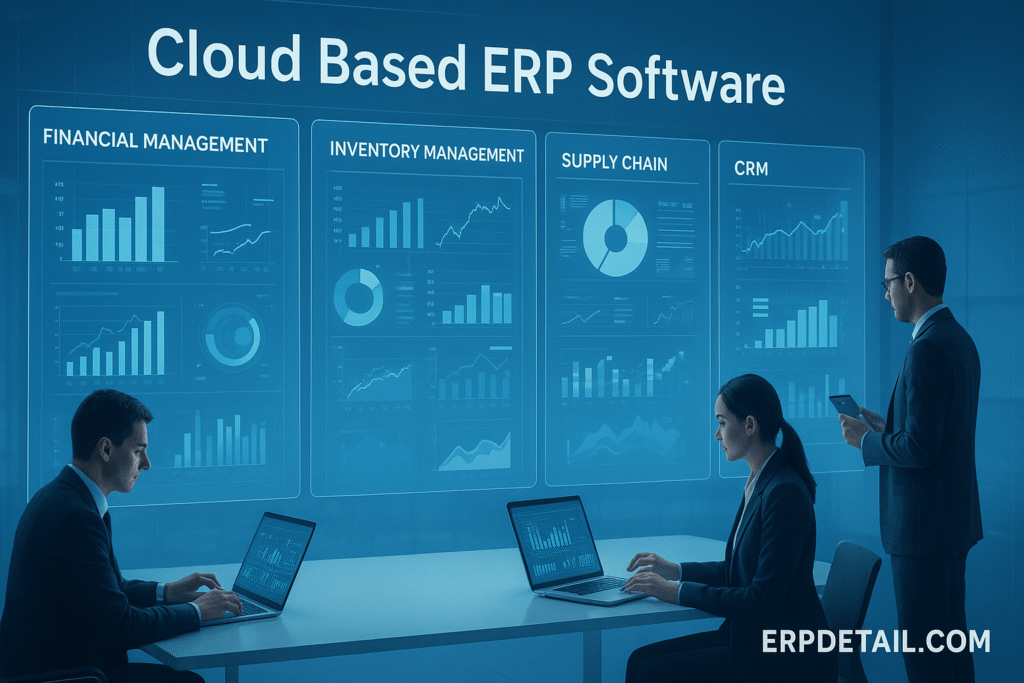
In today’s fast-changing business world, cloud based ERP software has become an essential tool for organizations of all sizes. By shifting from traditional on-premise models to cloud-based ERP systems, companies can streamline processes, improve user experience, and manage business data more effectively. A cloud ERP solution not only meets specific needs but also ensures real-time access to insights across mobile devices, making it easier to respond to dynamic business needs.
Key Features of Cloud ERP Systems
Real-Time Access and Analytics
One of the strongest advantages of Cloud ERP systems is their ability to provide real-time data visibility. Whether it’s monitoring warehouse management, evaluating supply chain management, or checking financial management reports, organizations gain accurate insights anytime.
Core Business Modules
A cloud-based ERP system typically covers essential areas such as:
- Financial management and accounting for precise tracking
- Inventory management with automated stock updates
- Customer relationship management for improved customer service
- Human resources to manage talent and payroll
- Warehouse management and supply chain management integration
User-Friendly Experience
Modern software solutions emphasize user experience through mobile accessibility, intuitive dashboards, and simplified best practices for managing complex Cloud Based ERP Software business processes.
Benefits of Cloud ERP Solutions
Cost Efficiency and Flexibility
Cloud-based ERP software eliminates the need for heavy IT infrastructure, making cloud-based ERP solutions a cost-effective choice. Businesses no longer have to worry about hardware upgrades or maintenance, and the software solutions can scale with specific needs.
Improved Collaboration
With access across mobile devices, teams can work from anywhere, ensuring smoother communication. This boosts customer service and improves Cloud Based ERP Software business processes at every level.
Security and Compliance
Leading providers ensure strict data security, compliance with global regulations, and reliable disaster recovery systems. Companies adopting a cloud ERP solution can trust their business data remains protected.
Cloud ERP Deployment Models
- Public cloud ERP software: Shared infrastructure for multiple businesses, affordable and scalable.
- Private cloud ERP software: Dedicated environment for greater control and data security.
- Hybrid ERP solutions: A mix of on-premise and cloud, ideal for specific needs and legacy integrations.
Cloud ERP for Different Business Sizes
- Cloud ERP software for small business: Affordable, quick to deploy, designed for limited budgets.
- Cloud ERP software for medium-sized companies: Offers scalability and more advanced software solutions.
- Enterprise-level cloud ERP platforms: Feature-rich, integrated with best practices for global operations.
Industry-Specific Cloud ERP Applications
- Manufacturing ERP on cloud: Streamlines production planning and warehouse management.
- Retail ERP software in the cloud: Enhances point-of-sale, inventory management, and customer relationship management.
- Construction ERP software solutions: Helps track projects, resources, and compliance.
- Healthcare and education ERP systems: Focus on patient, student, and staff business data management.
Leading Cloud ERP Vendors and Platforms
- Oracle NetSuite ERP – Popular cloud ERP solution Cloud Based ERP Software for global enterprises.
- SAP S/4HANA Cloud – Advanced Cloud ERP systems with AI and automation.
- Microsoft Dynamics 365 – Flexible and user-friendly cloud-based ERP software.
- Infor CloudSuite – Industry-focused software solutions with strong analytics.
- Odoo cloud ERP – Open-source cloud-based ERP system with modular design.
Challenges and Considerations
While adopting cloud-based ERP solutions, businesses may face:
- Data migration challenges when moving business data from legacy systems.
- Customization needs for specific needs in industries like construction ERP software or manufacturing.
- Training teams in new best practices to Cloud Based ERP Software maximize user experience.
- Balancing cost vs. ROI when selecting the right cloud ERP solution.
Future Trends in Cloud ERP Systems
The future of Cloud ERP systems is shaped by advanced technologies:
- Artificial intelligence and machine learning for predictive analytics
- IoT-enabled ERP solutions to connect devices in warehouse management
- Blockchain for secure business data exchange
- Greater emphasis on mobile devices and personalized user experience
Conclusion
For organizations of all sizes, cloud based ERP software offers flexibility, real-time access, and seamless integration of business processes. Whether through Cloud Based ERP Software public cloud ERP software, private cloud ERP software, or hybrid ERP solutions, companies can choose models that meet their business needs. By adopting trusted cloud ERP solution providers like Oracle NetSuite ERP, SAP S/4HANA Cloud, and Microsoft Dynamics 365, businesses can achieve growth while ensuring data security and operational excellence.
FAQ’s
What is cloud ERP?
It refers to cloud-based ERP software that runs on remote servers, providing access to business data and modules like financial management and inventory management over the internet.
How is cloud ERP different from on-premise ERP?
Unlike traditional models, a cloud ERP solution runs on external servers, requires less hardware, and offers real-time updates across Cloud Based ERP Software mobile devices.
Which businesses should use cloud ERP software?
From startups using cloud ERP software for small business to large enterprises with enterprise-level cloud ERP platforms, it suits any organization Cloud Based ERP Software with evolving business needs.
Is cloud ERP secure?
Yes, leading cloud ERP systems prioritize data security, encryption, and compliance with international regulations.
What industries benefit from cloud ERP?
Sectors like manufacturing ERP on cloud, retail ERP software, construction ERP software solutions, healthcare, and education all benefit from cloud-based ERP systems.